The Cover Pictures
Original credits
Cover Photography by Sherwin Tilton
Liner Photography by Sherwin Tilton, Coy Featherston & Steve Magedoff
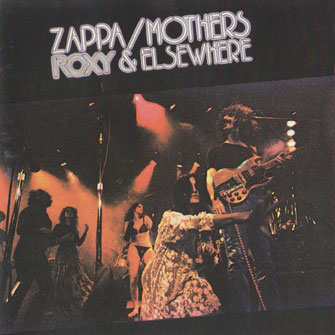
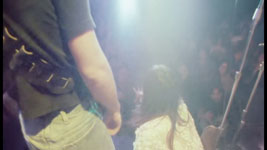
The Gibson SG
Are you still using the SG pictured on the cover of the "live" Roxy & Elsewhere album?
No, I have another SG that I'm using. The one that's on the Roxy cover has since been thoroughly injured by an airline company, they beat the hell out of it. They cracked the neck, and the most recent time it came back from Europe the binding was off the fretboard. I had the neck repaired, but it's never been the same; it flexes so much that it's hard to keep in tune, so I hardly use it anymore.
The Roxy
The Roxy was opened on September 23, 1973, by Elmer Valentine and Lou Adler, along with original partners David Geffen, Elliot Roberts and Peter Asher. They took over the building previously occupied by a strip club owned by Chuck Landis called the Largo.
Landis moved to Los Angeles in 1945 from his native Minneapolis and opened a small room, the Morocco, on Vine Street in Hollywood, hoping to capitalize on post-World War II prosperity. The nightclub was a success, and over the next decade, Landis opened several others, including the Crescendo and the Interlude in West Hollywood.
In the 1950s, he converted an old Sunset Strip supermarket into the Largo, which he billed as the nation's "class" burlesque house. When public interest in burlesque waned, Landis accepted an offer from recording executive Lou Adler and Whisky owner Elmer Valentine to change the club's name to the Roxy and to offer rock concerts.
If you wanted to play [at The Troubadour], you signed those contracts. David [Geffen] and Elliot [Roberts] thought it was an injustice to the acts, so with Lou Adler and [club owner] Elmer Valentine, they opened the Roxy.
The Recordings
Liner notes by FZ, 1974
Most of the material in this double set was recorded Dec. 10, 11 & 12, 1973, at The Roxy, Hollywood. Other portions were extracted from road tapes (4-track 15-ips masters) of show #2, Mothers Day, 1974, at the Auditorium Theater in Chicago, and the recent gymnasium extravaganza at Edinboro State College, Edinboro, Pennsylvania, May 8, 1974.
Some of the material has been overdubbed (Bolic Studios & Paramount Studios, Hollywood), but all basic tracks are live. The Roxy remote recording was done by Wally Heider (16-track 30-ips), engineered by Kerry McNab (who also is responsible for the re-mix on the whole album). The engineer for the road tapes was Bill Hennigh. None of the road material has been overdubbed.
The Concerts
Rose, "Roxy," Variety, December 11, 1973
The Roxy was packed with an impatient crowd waiting anxiously as sound-recording personnel and film crew synchronized their equipment for a filming of Frank Zappa & the Mothers of Invention, which Zappa wanted for his personal use. As the curtain went up so did one the mike stands which hooked onto it, surprising everyone including Zappa.
Silverfoiled drapery lined the back and sides of the stage surrounding two full sets of drums, at least three vibe sets, kettle drums and gogs, several keyboards and a synthesizer.
December 12, 1973—Bolic Sound, Inglewood, CA
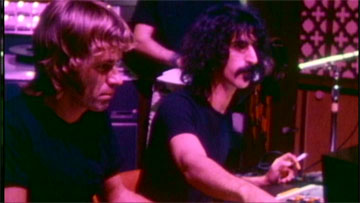
[Bob Hughes & FZ]
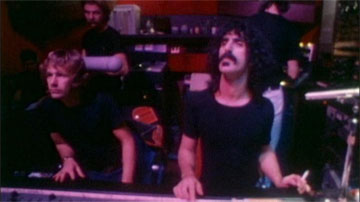
[Bob Hughes & FZ]
Charles Ulrich, October 10, 2014
Sherman [Barrymore] Keene says that's not him in either photo.
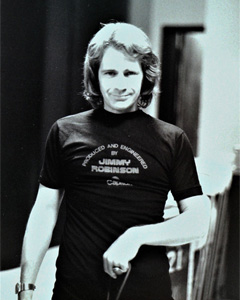
1. Penguin In Bondage
(Brian, I could use a little bit more monitor).
Sources & Edits
Patrick Buzby, December 30, 2015
I noticed one micro-edit in the "Penguin" monologue today. In the movie FZ says "when you fine - first took your clothes off" apparently because he changed his mind at the last moment and said "first" rather than "finally." On R&E he edited it to be "when you first took your clothes off" without the stumble.
Patrick Buzby, March 1, 2018
One note: the "Penguin In Bondage" guitar solo from Roxy & Elsewhere is from the December 8 show.
(Knirps for moisture)
'Knirps' the brand of a folding umbrella, and when I was in Australia . . . y 'know walking by this store, and here's this little wizened umbrella sitting in the window with a sign next to it, proudly proclaiming that the name of it was 'Knirps', and I thought, "what if I was designing an advertising campaign for this umbrella and . . . we didn't want it to be overstated, so it would say 'Knirps . . . for moisture'".
3. Dummy Up
Where you been in livin'? Reseda?
The evil dope pusher is cutting up a white gym sock, formerly owned by Carl Zappa and still damp.
Yes, the socks were mine. I was in the audience. Before Frank went on stage, he said he needed a pair of white gym sox and he asked me if he could have mine. He had it planned out beforehand. [...] I just really liked the energy of the crowd. Everyone cheered when Frank said my name. That made me feel good.
A true Zen saying: Nothing is what I want . . . The results of a higher education!
I was interested in Zen for a long time. That's what got me away from being a Catholic, fortunately. But it's my observation that eastern religions are wonderful if you are living anywhere but the United States. The best they can do for you here is, uh, give you a certain feeling of calm, if you can practice meditation and abstinence by yourself, away from everything else that's happening. The real goal of eastern religión, with mystical experience and all that, those aims are difficult if not impossible to achieve in an industrial society. And I think that most of the people who claim to have made satori someplace in the States today really gotta be pulling your leg. And I think that that sort of enlightenment bears very little relationship to the amount of chants that you can sing.
Sources & Edits
| The Roxy Performances (2018) |
Roxy & Elsewhere (1974) |
| December 8, 1973 |
|
| 7. 2. Pygmy Twylyte/Dummy Up |
3. Dummy Up |
| 02:16-02:54 |
0:00-0:38 |
| 02:54-03:23 |
|
| 03:23-03:53 |
0:38-1:07 |
| 03:53-04:01 |
|
| 04:01-04:13 |
1:07-1:19 |
| 04:13-05:11 |
|
| 05:11-06:15 |
1:19-2:22 |
| 06:15-07:12 |
|
| 07:12-07:44 |
2:22-2:54 |
| 07:44-08:13 |
|
| 08:13-08:46 |
2:54-3:27 |
| 08:46-09:14 |
|
| 09:14-09:18 |
3:27-3:31 |
| 09:18-10:03 |
|
| 10:03-10:07 |
3:31-3:35 |
| 10:07-10:11 |
|
| 10:11-10:56 |
3:35-4:19 |
| 10:56-13:08 |
|
| 13:08-14:21 |
4:19-5:31 |
| 14:21-15:49 |
|
| 15:49-16:01 |
5:31-5:43 |
| 16:01-16:09 |
|
| 16:09-16:29 |
5:43-6:03 |
| 16:29-20:25 |
|
4. Village Of The Sun
I'll never forget [...] overdubbing George's vocal on 'Village Of The Sun' for the Roxy album. A lot of people don't realise that that's all me, because you can harmonise best with your own voice.
The name of this song is "Village Of The Sun," and it tells the story of a black community in the desert in California, where the people raise turkeys. In this area, I used to work in a little club called the Village Inn and Barbecue. I used to play there on weekends with a band. The club was owned by a woman named Thelma. And Thelma was married to a guitarist that used to work with some jazz bands during the thirties and forties named Teddy Bunn. Maybe you know him. So Teddy used to hang out and sit on the side and wait to sit in with the group. We were playing songs like "High Heel Sneakers" and "Steal Away" and "Midnight Hour." But when we would stop for a minute, Teddy would come over and play jazz on the guitar. Of course this was a marvelous opportunity for me to get something to eat.
Even Johnny Franklin too
Little Mary
And Teddy
And Thelma too
Jim Cohen's lecture brought forth the information (from Frank's brother Bob, father of noted saxophonist and contributor to BANANAFISH, Stanley Jason Zappa) that "Thelma" in the song refers to Johnny Franklin's mother.
Charles Ulrich, August 23, 2014
I talked with John Franklin on the phone. [...] Thelma, the owner of the Village Inn, was not Johnny Franklin's mother.
Past the Village Inn & Barbecue
To mention Sun Village the people out there accepted our group fondly—just young kids out there doing their thing. I think Frank really appreciated the way he was accepted out there in that community and always had a fondness for it. [...] People out there stood behind him, like "Don't mess with Frank," and "Bring it on, Frank." We were doing jobs, we worked Palmdale, Lancaster, Edwards Air Force Base—we did a lot of local stuff. They sponsored us on a lot of local gigs, stuff like this. People that he'd (later) sing about in "Village Of The Sun." He remembered me, he remembered Teddy [Bunn].
Where the stumblers gonna go
To watch the lights turn blue?
Between sets they'd turn on the jukebox and, as soon as they did, a guy they called "The Stumbler" would go over to it, and dance FOR it—he'd sort of worship it, as if it was The Shrine Of Music. Eventually, he'd be joined by a couple of 'assitant stumblers,' and they'd all bob and weave and grovel in front of it.
I watched this for a few weeks and finally, one night, decided to talk to him. I thought he'd be some kind of space-wino. He wasn't—he was an okay guy. He was drunk, to be sure, but not out of his mind—just happy. He invited me to go to his house. I couldn't turn this offer down—like it says on the Freak Out! album: "Who could imagine . . . " what kind of a place Mr. Stumbler lived in? I had to find out.
After the gig, I followed him out into the desert a few miles, to a small turkey ranch. There was a handmade sort of house with cinder-block steps. The light was on in the front window. I followed him in. In spite of the shabby exterior, the living room was pleasant, with new furniture and a very large, very new Magnavox stereo. Apparently he'd been listening to some records before his evening romp in front of the jukebox—maybe a pregame warmup. The album on the turntable was Stravinsky's Firebird Suite.
Sources & Edits
6. Don't You Ever Wash That Thing?
Mike, January 19, 2014
After 30 years of listening to fz I just realized that BE BOP TANGO is quoted in the melody to DONT YOU EVER WASH....
Ruth Underwood, Roxy By Proxy (2013), liner notes
At some point, Frank suggested we split the theme at specific places and insert five-beat drum fills into these measured intervals. We had a bit of a laugh imagining this new plan. Soon we were in a boisterous mood, and some of us chimed in with our own proposals. By the time Ralph offered his stroke of brilliance—to eliminate the drum fills altogether at the repeat, and have only silence during those gaps—, we were truly manic and laughing uncontrollably. [...] Ralph's idea also stuck!
[FZ] delighted in compounding the difficulty by giving us other tasks to perform within the allotted time, such as pretending to comb our hair (think Kookie, on "77 Sunset Strip") or turning completely around before resuming our parts. FZ enjoyed trying to derail me personally during the "Watch Ruth" segment, and frequently changed what he said or how he said it; his entertaining schtick often made it harder for me to concentrate on counting than to play the written lick itself.
[...] Dweezil has described an aspect of Frank's music as "cartoonesque," and there's a wonderful example of that in Frank's use of a phrase he borrowed from Penguin In Bondage. Here, it occurs twice, in two series of three times each, and is quite grotesquely presented, to great effect.
Sources & Edits
7. Cheepnis
Can you tell me any movies you liked?
Yeah. 'The Beast From Haunted Cave', 'Wasp Woman', 'The Killer Shrews'—those are the kind of movies I used to go and see. Science Fiction movies.
But some of them are really badly made.
I know, but I didn't go there to see an artistic experience, I went there to crack up. I wanted to see the guy turn around and I wanted to see the zipper on the back of the monster. The cheaper the better, that was my idea of a good time.
You don't go and see Godard and people like that?
No.
I asked [FZ] which were his favorite movies. "The Killer Shrews, The Beast of Haunted Cave, Mesa of Lost Women and The Brainiac," he sputtered out. I had never heard of them and was confused by their obscurity.
"You don't see them very often anymore. In fact the only way to see Mesa of Lost Women is by renting it for about $14 from Budget Films."
The monster,
Which the peasants in this area call FRUNOBULAX
Ruth Underwood, in the liner notes of Roxy By Proxy (2014)
"Frunobulax" is a name Gail thought up, based on the name of a cow Moon drew when she was five years old.
Bullets can't stop it
Rockets can't stop it
We may have to use NUCLEAR FORCE!
The Spider (Bert I. Gordon, 1958)
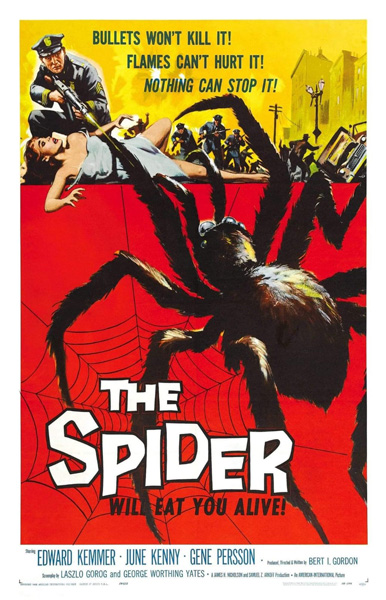
Sources & Edits
| The Roxy Performances (2018) |
Roxy & Elsewhere (1974) |
"Cheepnis" (2013) |
| December 10, 1973, late show |
|
|
| 5. 5. "I Love Monster Movies" |
7. Cheepnis |
|
| 0:00-2:08 |
0:00-2:07 |
00:32-02:40 |
| 2:08-2:10 |
2:07-2:09 |
|
| 5. 6. Cheepnis |
|
|
| 0:00-1:12 |
2:09-3:21 |
|
| 1:12-1:26 |
3:21-3:36 |
03:54-04:09 |
| |
3:36-3:58 [Bolic Sound, Inglewood, CA, December 12, 1973] |
07:29-07:51 |
| |
3:58-5:02 [Bolic Sound, Inglewood, CA, December 12, 1973] |
- |
| 1:49-3:19 |
5:02-6:31 |
|
9. More Trouble Every Day
On
this particular tour we've just spent 2 weeks rehearsing, for nostalgic
purposes, a collection of songs from the FREAK OUT album. And there's
not much jamming in that. I mean you have to learn the arrangements. We
have one long, continuous slab of relentless FREAK OUT music. It's
funny, you know. If we play that—we haven't unleashed it yet on an
audience, [this Allendale, MI, one will] be our first concert on the tour and it's our newest
piece of old stuff. And we've never done that before. You know we've
never gone out and played vast quantities of stuff from albums. Usually
our show consists of things that are unreleased, or a small sample of
request songs. But now we have like a half an hour or 45-minute
continuous piece of familiar material. And I'm anxious to see what's
gonna happen if we play it for an audience, because we're always
getting requests for things we never bothered to learn.
[...] The FREAK OUT thing [...] starts off with "It Can't Happen Here" and then goes into "Monster Magnet" and then "Hungry Freaks" and "Probably Wondering Why I'm Here" and then "How Could I Be Such a Fool?" "No Heart," "I'm Not Satisfied," "Wowie Zowie," "Let's Make the Water Turn Black," "Harry You're a Beast," "Orange Country Lumber Truck," "Oh 'No," "Watts Riot Song," and "Mother People," and that is all continuous straight through.
The Drum Fill
JM: You mentioned Weather Report which obviously brings Chester to mind. At the end of "Duke's Travels" there's that massive linear drum fill which you just played at sound-check, the same one on Seconds Out. Did you get that from "Trouble Every Day" [Zappa]?
PC: Yeah. We've put it in a few places. We do it in "Afterglow" and then we do it in "Duke's Travels."
JM: [...] You mentioned Weather Report earlier. Was it Chester's playing on Black Market that convinced you he was right for Genesis?
PC: It was the Zappa Live album really. I've always liked Zappa, he was always kind of interesting, though I never saw him live. That album Live At Roxy [Roxy & Elsewhere] was fantastic and when I heard that stuff he did with Ralph Humphrey I said, "That's incredible. That's it . . . I want that. I want a bit of that." (Laughs).
So I rang Chester, and he'd heard of the band I think but we'd never met, and he actually joined the band without the other guys having met him (laughs). Day one of rehearsal, no one had met him. You know, he just walks in and says, "Hello, I'm your new drummer." (Laughs).
That's kind of weird to think it could happen like that. I can't imagine that happening now.
There wasn't an audition, actually. [...] When [Phil Collins] called, he was apparently a pretty big fan of (Zappa's) Roxy and Elsewhere, and he was specifically looking for a drummer who could play with another drummer. He wasn't totally willing to just give up the drum chair, so he was hoping to find someone who would be comfortable playing in a two-drummer situation. There was one song (on that album) with a specific fill that a lot of drummers were into at that time. In fact on the first day of rehearsal, the first thing he said is, "Ok, how do you play the fill?" and I knew exactly what he was talking about (laughs). It's two distinctive drums parts that sound pretty amazing. Basically, he said that he had heard the Roxy and Elsewhere album, and he talked with the other guys in the group and had played for them various tracks that I had recorded. I don't necessarily know which ones. And, if I am not mistaken, he had gone to the London Weather Report concert, which happened to be the last gig I did with them. He said that he had already done all of that so, since they were all in favor of it, if I wanted the gig it was mine. That's pretty much how it went.
Chester Thompson, interviewed by Prog Magazine, March 2024
On "More Trouble Every Day" from Zappa's Roxy & Elsewhere, you and Ralph Humphrey play a syncopated two-bar drum break together a number of times during the song. We understand that Phil collins loved that break and you played it together with Genesis?
It's at the end of "Afterglow" [on Seconds Out]. At the first rehearsal, Phil and I were set up before the others, and we were just jamming. He suddenly stops and goes, "How do you play the fill?" And I knew exactly what he was talking about. I taught it to him, as it takes two people to play it. When one person is playing toms, the other's on the bass drum and then you reverse it. I wish I had written it, but it was Ralph Humphrey.
Sources & Edits
10. Be-Bop Tango (Of The Old Jazzmen's Church)
Brenda, imported from Edwards Air Force Base, where she . . . Ladies and gentlemen, Brenda . . . Brenda is a PROFESSIONAL HARLOT, and she just got finished stripping for a bunch of guys at Edwards Air Force Base, and she made it down here in time for the show.
How did you come to appear on stage at the Roxy with Frank—is his description of what you were up to beforehand accurate?
Yes, I did a show at Edwards that night. Then a friend called and asked me to do the show at the Roxy.
Can I ask who that friend was?
Carl Franzoni. He also was in the show.
He sure was! Were you a fan of Frank's music?
Yes—who wasn't a fan of Frank?
Did you have any contact with Frank after the Roxy?
No, not much contact after the show. But he was nice.
Brenda has a lovely assistant named Carl, or Robert James Davis if you prefer.
Pretty certain I saw [Carl Franzoni] and a few dancers with Zappa during a concert at the Roxy taping in 1974. They were introduced on the stage as some people whip had been around Hollywood for a long time. The song was The Bebop Tango.
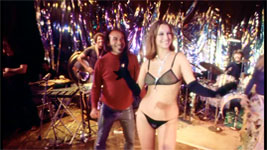
[Carl Franzoni & Brenda]
He did send me a telegram for something he was doing at the Roxy, and I'm on the cover of that, dancing on the stage with him.
And he asked me to come and bring some dancers and— It was a low level, we could only dance around, but he got me on the stage, whoever did the photography, he got me in this kind of a shadow.
Sources & Edits
| The Roxy Performances (2018) |
Roxy & Elsewhere (1974) |
| December 10, 1973, late show |
|
| 5. 10. Tango #2 Intro |
10. Be-Bop Tango (Of The Old Jazzmen's Church) |
| 0:06-1:30 |
00:00-01:22 |
| 1:30-1:44 |
|
| 1:44-1:46 |
01:22-01:24 |
| 1:46-2:01 |
|
| 5. 11. Be-Bop Tango (Of The Old Jazzmen's Church) |
|
| 00:00-02:46 |
01:24-04:10 |
| 02:46-02:58 |
|
| 02:58-03:59 |
04:10-05:12 |
| 03:59-04:25 |
|
| 04:25-05:24 |
05:12-06:10 |
| 05:24-05:26 |
|
| 05:26-05:55 |
06:10-06:39 |
| 05:55-05:59 |
|
| 05:59-06:41 |
06:39-07:21 |
| 06:41-06:50 |
|
| 06:50-06:55 |
07:21-07:26 |
| 06:55-07:05 |
|
| 07:05-07:58 |
07:26-08:19 |
| 07:58-08:02 |
|
| 08:02-08:21 |
08:19-08:38 |
| 08:21-08:24 |
|
| 08:24-08:28 |
08:38-08:42 |
| 08:28-08:40 |
|
| 08:40-08:55 |
08:42-08:58 |
| 08:55-09:01 |
|
| 09:01-09:33 |
08:58-09:30 |
| 09:33-09:38 |
|
| 09:38-09:48 |
09:30-09:38 |
| 09:48-09:57 |
|
| 09:57-10:22 |
09:38-10:03 |
| 10:22-10:22 |
|
| 10:22-10:44 |
10:03-10:25 |
| 10:44-11:03 |
|
| 11:03-11:22 |
10:25-10:44 |
| 11:22-11:36 |
|
| 11:36-11:51 |
10:44-10:59 |
| 11:51-12:03 |
|
| 12:03-13:07 |
10:59-12:03 |
| 13:07-13:11 |
|
| 13:11-15:16 |
12:03-14:05 |
| 15:16-15:20 |
|
| 15:20-15:25 |
14:05-14:10 |
| 15:25-15:26 |
|
| 15:26-15:35 |
14:10-14:19 |
| 15:35-16:52 |
|
| 16:52-17:01 |
14:19-14:28 |
| 17:01-17:50 |
|
| 17:50-18:15 |
14:28-14:52 |
| 18:15-18:40 |
|
| 18:40-18:57 |
14:52-15:09 |
| 18:57-19:22 |
|
| 19:22-19:55 |
15:09-15:42 |
| 19:55-20:07 |
|
| 20:07-20:43 |
15:42-16:17 |
| 20:43-21:08 |
|
| 21:08-21:31 |
16:17-16:39 |
| 21:31-22:08 |
|
Additional informant: Hammack.






